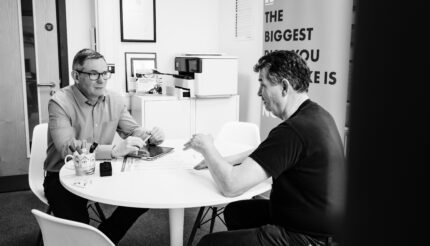As COVID-19 continues, many of us are still living and working in isolation, or without the usual level of social interaction. I am lucky enough to be working from home, and still interacting with people on Zoom or other online platforms. I am missing out on those casual interactions with people, the water cooler or coffee run chat; the polite nothings when in a shop and joining a friend or two in one of the lovely coffee shops we have in Oakham.
I know I am lucky, and the whole Covid-19 crisis still put a huge strain on my equilibrium in the beginning of lockdown. The worry, anxiety, anger, and disbelief hit me for six. Without the virtual support of friends and colleagues, I would probably have spent the first 4 weeks in bed!
One of the things I am grateful for is that in ActionCoach we concentrate very much on mindset, ours and our clients, business owners and team players. There are four techniques that helped me – and I hope that they can help you.
If you fancy a virtual coffee before we can meet again face to face, make a date here
The voice in your head
The voice in your head is your internal dialogue which comments on everything around you, whether consciously or subconsciously. This little voice gives us the ability to reason and evaluate situations, but it can also affect our mood, self-confidence and how we react. But it can be managed, learning how to select what I listened to helped me through. If you need any advice on selective listening just ask a teenager!
Keep it positive. Be aware of what we are saying to ourselves and how it influences us. Simply thinking ‘I wonder what my next thought will be’ disrupts our internal dialogue and gives our brains the space to become aware of what is happening. At this point, we can then change our internal voice to have a positive spin. For example, you should not think “I did that wrong”, but instead “how can I do that differently next time to improve”. This may take time to achieve, but by practising managing our internal dialogue we can improve our self-perception and self-esteem.
Above and below the line thinking
How do you manage and react to situations? Do you thoughtfully respond or just react automatically? Are you in Victim or Victor mode? I must admit to being below the line more than once in this crisis.
If we are operating above the line, our responses are typically quite open and positive. We take ownership, accountability and responsibility. If we are operating below the line, our actions are usually more closed and negative. We tend to deny, make excuses, get defensive and point the blame.
This helps how we respond to situations, both good and bad. If we realise that we are operating below the line, we can have the conversation about why that is, and how we can operate above the line once more. This allows for more curious and effective outcomes to be reached by us and the entire team. The resulting culture is also more positive and supportive, a far healthier environment to work in.
Making the time to plan
There is so much uncertainty around now that I have felt the need to be in control of what I can control. I worked at what I wanted, what I could control and what I could not
Simply having a plan, or a list to work through, greatly reduced the uncertainty surrounding which tasks to prioritise, allowing a clear direction for tasks to be followed.
So, I am working on my 90-day plan and every day I write up my Frog Sheet. At the end of each day, I complete a Frog Sheet which details what tasks I need to complete the following day. It has the most important (though perhaps the most disliked) task at the top of the page, all the way down to emails to be sent or calls we need to make. This means we begin each new day in the knowledge of where to start and what our day will look like, roughly at least. If I have forgotten to do this at the end of any day, I really notice it the next morning and it can take until lunchtime to get my mood right again.
Taking accountability and responsibility
In our plan for the business we have assigned areas to the different team members. We are going for 100% inclusion of all team members into the business. We do not want anyone feeling devalued, left out or insignificant.
Having input into the tasks to be completed, and clarity about who is accountable, displays trust and value. Allowing people to take accountability and responsibility for certain tasks gives direction for your day. But also, it presents opportunities for learning and development.
Support, help and confidence to try new tasks in an unjudged environment allows for professional growth and ensures high standards and high commitment. Doing a mixture of tasks you enjoy, tasks you are good at and tasks that challenge you will help boost your self-esteem. Make sure you have a few of these tasks in your working week, it could be a small task, but one you can do well. Or one you are working towards and improving on each week.
But also, don’t be afraid to ask for help and talk about your feelings. Regular supervision sessions, whether on a phone or through a video call, can be a great opportunity to raise any issues or worries.
In summary
During difficult times, it’s easy to spiral into a negative pattern of working behaviours, especially without the space to voice your concerns in the workplace. By changing the way we react to situations, working above the line, taking responsibility for tasks and being open with our colleagues when a catch-up is needed, a culture of openness and support is produced. Taking time to plan your tasks for each day so you have direction will help you feel in control of your workload. And finally, listen to the voice in your head, and manipulate the dialogue in a positive way which allows for growth, rather than destruction.
Whilst we manage the current stage of lockdown, we also need to begin preparing for when lockdown ends. Rules are changing daily so we do not know what warning we will have of the changes. Watch our webinar exploring this topic for a deep review of what your business may need. [https://oakham.actioncoach.co.uk/2020/05/16/preparing-for-the-end-of-lockdown/





